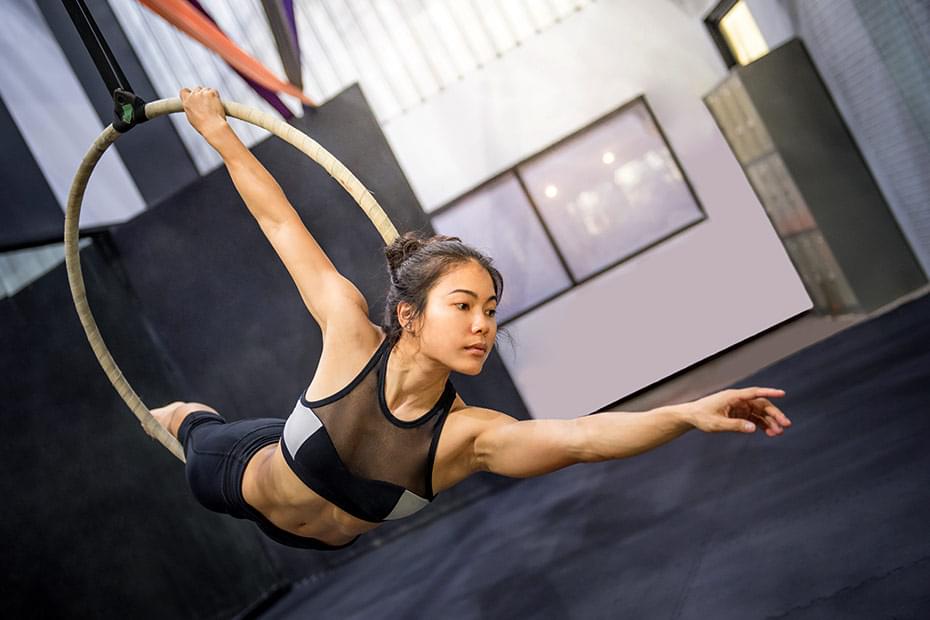Published January 12, 2018 • 4 Min Read
When three-time Olympic medalist Karen Cockburn first started trampoline at age 11, career aspirations were not top of mind. “Even into my twenties, sports always came first for me,” says Cockburn. What she may not have realized at the time was that many of the skill sets she was developing through her athletic training were also making her an ideal candidate for many career options.
“Especially for more junior candidates, it can be hard to make your resume stand out from the crowd,” says Trina Boos, President of Boost Agents Inc. “Increasingly companies are seeking out ‘interesting’ candidates who have a background in sports or the arts and can bring something else to the table.” There’s a need to see more layers, and companies realize the power in soft skills that can’t easily be taught.
Here are five 21st century job skills, developed by athletes, and how they can make you stand out from the crowd.
1. Persistence
“Athletes have drive that helps them push through tough projects when others would give up,” says Boos. Cockburn adds that competitive athletes also need to know when to push and when it’s time to take a break. “If you want to make it to the top, you need to strategize about how to be at your best when it counts.” Athletes are incredibly persistent. Combine this with the ability to recognize when it’s important to shine and when it’s okay to back off a bit, and an employer can be confident they have hired someone who delivers when they need to.
2. Confidence
An individual athlete can’t accomplish anything on their own
Karen Cockburn
Each year Boos hosts a Next Generation Dinner Series aimed at finding new talent and guiding these recent graduates on their path to success. She finds a lot of the stand out candidates have skill sets such as athleticism that stand out from basic academics.
One of those success stories is Jason Dunphy who went through the networking dinner series and was recently placed as an account supervisor at Leo Burnett. “You just looked at Jason and knew he was going to succeed,” recalls Boos. Much of that was his confidence, which he credits to competing at a high level in martial arts. “I got used to putting myself in an uncomfortable situation and figuring out how to work through it,” says Dunphy. “Eventually I became comfortable with the uncomfortable. This has given me the confidence to know that, regardless of the obstacle in front of me, I am confident in my ability to problem solve and work through any situation.”
Research out of Cornell University backs up Dunphy’s theory of confident athletes. The study published in the Journal of Leadership & Organizational Studies found that people who played a varsity high school sports are more self-confident, have more self-respect, and demonstrate more leadership skills than people who were part of other extracurricular activities or did no extracurricular activities.
3. Collaboration
Even though Cockburn didn’t play on a team sport, she is quick to comment that the process of getting to the podium requires a small army. “An individual athlete can’t accomplish anything on their own,” says Cockburn. Competing at a high level requires collaboration with other athletes, coaches, doctors, physiotherapists, biomechanics coaches and a whole support team. Working with all of these different experts creates an ability to collaborate and work together to reach a common ground. These team-player skills can be invaluable in the work place.
If you want to make it to the top, you need to strategize about how to be at your best when it counts.
4. Communication
The more you do something, the better you get at it. Athletes are trained as motivational speakers and to answer media questions from a young age. “The more you communicate, the better you get at it,” says Cockburn. Knowing how to speak in front of the media or coworkers can be invaluable in helping to drive key priorities and build understanding for specific programs and initiatives.
5. Resilience
Competing at a high level can change the way you look at the world. Research out of Stanford University found that sports can develop critical thinking skills and enhance moral and ethical reasoning. “Athletes often think through situations differently because they look at failure differently,” says Boos. Athletes look at failure as an opportunity to learn how to do better. They are more likely to look at why they failed and then take steps to ensure the outcome is different the next time around.
In today’s competitive market, adding these soft skills to your repertoire can make you stand out from the other candidates – and get the job!
This article is intended as general information only and is not to be relied upon as constituting legal, financial or other professional advice. A professional advisor should be consulted regarding your specific situation. Information presented is believed to be factual and up-to-date but we do not guarantee its accuracy and it should not be regarded as a complete analysis of the subjects discussed. All expressions of opinion reflect the judgment of the authors as of the date of publication and are subject to change. No endorsement of any third parties or their advice, opinions, information, products or services is expressly given or implied by Royal Bank of Canada or any of its affiliates.
Share This Article






